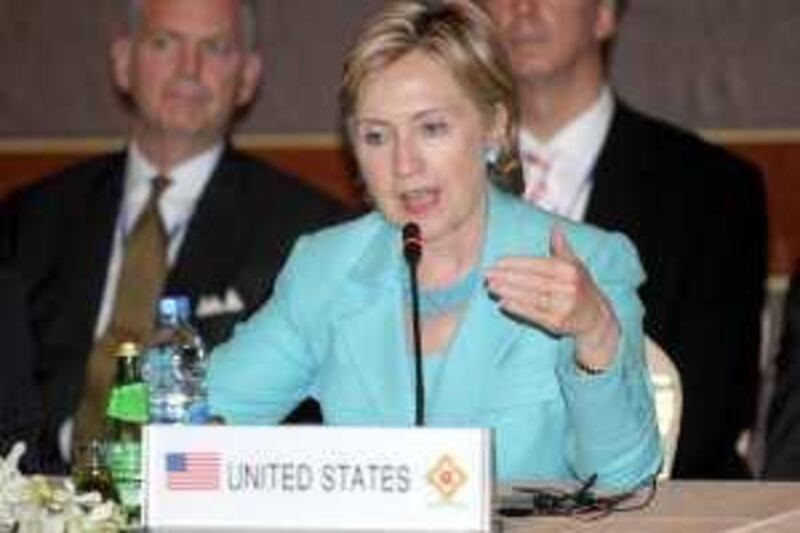PHUKET, THAILAND // Secretary of State Hillary Clinton today stirred Israeli fears that Washington would accept a nuclear armed Iran when she raised the idea of a US "defence umbrella" for Gulf allies. However, Mrs Clinton, during a visit to Thailand for an Asian security conference, said later that she was not announcing a new policy and simply wanted to turn Iran away from pursuing a nuclear weapon. Mrs Clinton told Thai television in Bangkok that President Barack Obama's administration was still open to engage Iran in talks about its nuclear programme but warned that Tehran would not be safer if it obtains a bomb. "We will still hold the door open" to talks over its nuclear program Mrs Clinton said. "But we also have made it clear that we will take action, as I've said time and time again, crippling action, working to upgrade the defence of our partners in the region," she said. Her previous references to "crippling action" have referred to sanctions. "We want Iran to calculate what I think is a fair assessment: that if the US extends a defence umbrella over the region, if we do even more to support the military capacity of those in the Gulf, it is unlikely Iran will be any stronger or safer," Mrs Clinton said. "They won't be able to intimidate and dominate as they apparently believe they can once they have a nuclear weapon." In Jerusalem, Israeli intelligence services minister Dan Meridor criticised her remarks. "I heard without enthusiasm the American declarations according to which the United States will defend their allies in the event that Iran uses nuclear weapons, as if they were already resigned to such a possibility," he said. "This is a mistake," Mr Meridor said. "We cannot act now by assuming that Iran will be able to arm itself with a nuclear weapon, but to prevent such a possibility." Mrs Clinton also warned about possible nuclear links between Myanmar and North Korea. Mrs Clinton said Pyongyang could be sharing nuclear technology with the military-ruled Myanmar, posing a major threat to the region. She was set to sign a treaty signalling renewed US commitment to South East Asia and to meet counterparts from China, Russia, Japan and South Korea for talks on restarting their stalled dialogue with North Korea. "We worry about the transfer of nuclear technology" from North Korea to Myanmar's ruling military junta, Mrs Clinton said in an interview with Thailand's Nation TV. On Tuesday, she said Washington was taking reports of conventional military co-operation between the two nations very seriously, adding that it would be "destabilising for the region."
Myanmar and North Korea, both isolated and under international sanctions, are expected to dominate Mrs Clinton's two days of discussions with the Association of South-east Asian Nations, or Asean, and at the broader Asean Regional Forum. US officials said a key thrust of Mrs Clinton's debut at the forum would be to crank up pressure on North Korea to return to six-nation nuclear disarmament talks after its recent missile and nuclear weapons tests. North Korea's foreign minister Pak Ui Chun declined to attend the meeting, instead sending a roving ambassador to Phuket, and South-east Asian officials say the Pyongyang delegation is concerned about coming under pressure.
Asean had asked China to play a key role in bringing North Korea back to the negotiating table, a Thai official said after the bloc's foreign ministers met their counterparts from China, Japan and South Korea today. Suspicions about Myanmar and North Korea escalated after a US Navy destroyer last month began tracking a suspect North Korean ship reportedly heading for Myanmar. Separately, a group of exiled Myanmar activists last month released pictures of what they said was a secret network of tunnels built by North Korean experts inside Myanmar. In Phuket, Mrs Clinton was later set to sign a treaty of amity and co-operation with Asean, a move designed to offset China's growing influence over the region.
Mrs Clinton said the American president Barack Obama's administration wants to send a strong message of engagement, after some felt the region was neglected by his predecessor George W Bush during the wars in Iraq and Afghanistan. China signed the same treaty with the 10-country Asean six years ago. "We give great importance to this region," Mrs Clinton said on Thai television. "We have to deal with everything from pandemic disease to piracy ... the United States has to be involved in this region." Mrs Clinton, meanwhile, said Asean should consider expelling Myanmar over its rights record if it doesn't free the jailed pro-democracy leader Aung San Suu Kyi. Myanmar has sparked outrage by putting the Nobel Peace Prize winner on trial over an incident in which a US man swam to her lakeside house. Mr Obama has described the court proceedings as a "show trial" while talk of a revised US policy toward Myanmar has been on hold since the trial began. The Obama administration has taken steps toward engaging not just Iran but other US foes such as Syria, Cuba and Venezuela even as its hopes of bringing North Korea to the table have stumbled. * AFP





